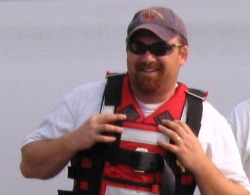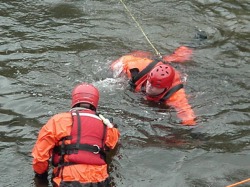Training

JODY PRATT, Training Director, prides himself on his desire to share the technical skills and knowledge that is required to make your job safer. JODY has traveled extensively throughout the Maritimes and Eastern US participating in and conducting many courses. He has made many affiliations with various training agencies and departments in his quest to become one of the best.
If you have any questions about any training, contact us.
"Education is not the filling of a bucket,
but the lighting of a fire." - W.B. Yeats
Ice, Water or Swift Water Rescue Technician Training

Register your department for any or all of our Rescue Tech courses early before you get the call to go out on a rescue!
We will ensure that your department is prepared for that call. Interested in hosting a course? Minimize your training costs by inviting others to share the course with.
Technical Rescue Technician Training
All courses meet or exceed NFPA 1670:2009
Each course is presented in either 8 or 16 hour format depending on your department's individual needs. Standard 8-hour courses are $250 per candidate (unless otherwise stated or quoted to your department)
Available course levels: Awareness, Operations, Technician and Trainer* as per NFPA 1670:2009
*Certain conditions and agreements must be agreed to by your department
Water Rescue
Ice Rescue
Swift Water Rescue
Boat Rescue
Dive Rescue
Confined Space Rescue
Rope Rescue
Carbon Monoxide Poisoning - The Silent Killer http://www.thesilentkiller.net/
Know the facts about CO poisoning
- CO poisoning can be difficult to detect.
- CO poisoning can present with flu-like symptoms, but it is also possible to be poisoned without having any symptoms at all.1
- CO poisoning puts firefighters at significant risk at the scene of a fire.
- Even mild CO poisoning causes mental confusion, which can lead to poor decision making, putting both the exposed firefighter and others on the fire scene at risk.2
- Mild CO poisoning can also rob the heart and brain of oxygen – nearly 50% of line of duty firefighter deaths are attributed to heart disease or stroke.3 That's why new NFPA 1584 rehab standards support the use of on-scene CO testing.4
- CO poisoning significantly increases long-term health risks.
- Just one severe CO poisoning almost doubles the risk of premature death.5
- Consistent exposure to CO poisoning may cause long term heart and brain damage.6
- Wear your mask during overhaul
- Test for carbon monoxide in the blood with an approved noninvasive device

